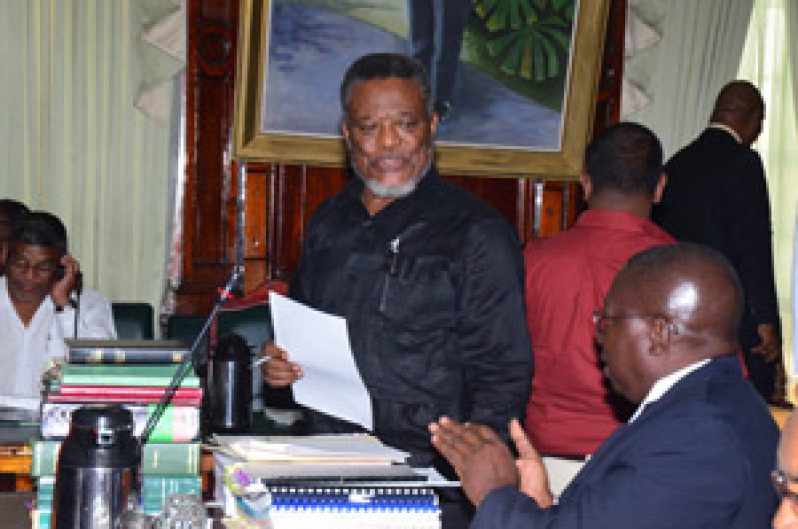SHARED government is not an ideal or critical situation for Guyana at present, according to Prime Minister, Samuel Hinds, who, in his presentation to the House last evening, said that there have been many arguments for and against the notion, but even the late President, Hugh Desmond Hoyte, himself had decided against it.
 The Prime Minister told the House that shared government would easily return Guyana to era of the 1950s.
The Prime Minister told the House that shared government would easily return Guyana to era of the 1950s.
He said that the PPP has been open to such overtures in the past, but would have been burnt.
He drew reference to the most recent negotiations regarding the Linden debacle surrounding the electricity subsidy in 2012, when he said government entered into talks with good faith but the party was hurt.
The Prime Minister said that there is the inherent risk of betrayal in any power sharing agreement, saying, “we don’t want a repeat of that risk.”
Hinds suggested that what is first needed is to build trust for political cooperation, “We think that is the way forward.”
He drew reference also to the fact that the ruling administration has made sacrifices in the past for the betterment of the country, and referred to the fact that the government had called elections two years early for the 2001 election.
The Prime Minister recalled that the move occurred in a time of Guyana’s history when the opposition was looking to make the country ungovernable, with the slogan of ‘slow fyah, more fyah.”
He said that it is “in the face of contrived mayhem that we agreed to hold elections two years early….that is the sacrifice we made.”
Hinds said that steady growth and development has been a hallmark of the current administration, “bringing benefits to all the people of Guyana…that is a historical fact…it is against this background that I support the 2013 Budget.”
The Prime Minister reiterated that growth and development for a country does not come smoothly and he reminded also that the “greater the growth and development, greater the potential for conflict.”
He said, “We do not think shared governance in the sense of shared ministries is the critical thing for Guyana,” said Hinds.
The Prime Minister conceded that the ruling administration is hesitant of shared government, in that it would mean a shifting of the contentions and abuses to the level of Cabinet.”
He said that for the sake of the young people today in Guyana, the government believes that the risk enjoined in shared government is too great at this point in time.
Hinds, turning his attention to the 2013 Budget, reminded that it has been created to attain steady sustainable progress, “a step by step approach to our dreams….our annual budgets enable our next steps on the decades-long journey to a developed state.”
The Prime Minister enjoined the House to celebrate the achievements made over the past years in relation to the performance of the country’s economy, and reminded that the country has graduated from the ranks of Heavily Indebted Poor Country (HIPC).
He reminded that the budget process is one of managing scarce resources and making hard and difficult choices within the resources available to the state.



.jpg)








